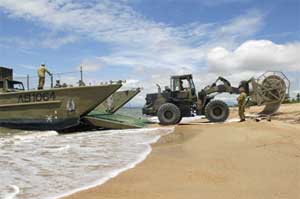Army Field Engineer
Tasks & duties

Army field engineers may do some or all of the following:
-
build bridges in order to cross waterways and other gaps
-
demolish structures such as buildings and bridges
-
construct and maintain roads
-
undertake assault boat operations
-
cut down trees
-
operate sawmills
-
maintain engineering equipment
-
weld metal parts together
-
operate water supply and purification equipment
-
clear and lay mines, and search for explosive devices
-
set and defuse booby traps
-
handle explosives
Skills & knowledge
Army field engineers need to have:
-
knowledge of surveying methods
-
knowledge of building and engineering
-
knowledge of safe handling of explosives and mines
-
knowledge of NZ Army regulations and tactics
-
the ability to use and repair machines and equipment
-
the ability to follow instructions
-
problem-solving skills
Entry Requirements
To join the NZ Army you must be:
-
at least 17 years old
-
a New Zealand citizen or permanent resident staying in New Zealand for at least five years
-
have no criminal convictions for the previous two years
-
be medically fit for service
To become an army field engineer you need to have NCEA Level 1 (12 credits per subject) English and maths or School Certificate equivalent.
Training on the job
Skills are gained on the job. All NZ Army recruits need to complete the 12-week All Arms Recruit Course (AARC) at Waiouru Military Camp before training for their specific trade.
Army field engineers must then complete an eight-week Basic Combat Engineer Course at Linton Military Camp. This covers the basics of field engineering, including building bridges, water supply, explosives, field defenses, obstacles, booby traps and boating.
They can then undertake specialist training in a range of trade and personal development courses, and can study extramurally towards higher qualifications.
Useful experience
Useful experience includes training in the Territorial Force and involvement in youth organisations or team activities. Basic mechanical or construction experience or work that requires practical skills may also be useful.
Related courses
Building Science and Technology
Construction Engineering
For more information, please refer to Career Services.
Document Actions
